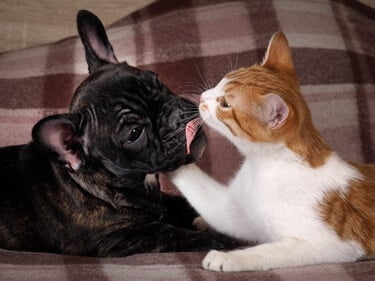Other animals often like cats, but the feeling is not always mutual. Cats can be hard to pair with another pet. Happily, you can bring additional animals into a cat’s home. You’ll just need to choose the species of a second pet carefully.
Cats sometimes enjoy living with other cats, but it depends on how territorial each cat is and how you manage introductions. Small, quiet dogs can live with cats as long as the dog displays no alpha tendencies. Cats and rabbits can be friends. Avoid small animals as pets if you have cats because hunting instincts will take over.
Ensure that your cat is willing to share its home with another animal. You also need a second pet that can coexist with a cat. It’s not easy, but get the balance right, and both pets will enjoy the company.
Do Cats Like To Be The Only Pet?
It can be hard to tell if your cat would enjoy the presence of another pet. Despite their reputation, not all cats are loners. Some felines actively enjoy having company. All cats are territorial by nature, which means that a cat will initially react adversely to any infiltrator to its home.
If you wish to adopt a second pet, you must work to get past this. Manage any introductions carefully, teaching your cat to share. Prove to the cat that another pet is a fun playmate, not a competitor for food, affection, and resources.
Of course, this is assuming that your cat even wants company. Some cats actively prefer being the only pet in a home. This is most likely to be the case with older felines. The cat has its routine set, and it likes things the way they are. Introducing new animals can lead to stress and anxiety.
The most important thing is that your new pet does not detract attention from your cat. If a cat’s routine changes, it will grow distressed. The cat will take this out on the infiltrator to the home.
Do Cats Like Living with Other Cats?
If you’re seeking a companion pet for your cat, another feline seems like the obvious solution. You know how to take care of cats, so the learning curve will be minimal. In addition, the animals will speak the same language.
Some cats enjoy like-minded company. As per Veterinary Clinics: Small Animal Practice, others are hostile to strange felines. Only you know if your cat would enjoy living with another pet of the same species. Monitor how your cat interacts with neighborhood cats.
Most cats will not react well to another cat initially. Kittens are open-minded, but adult and senior cats less so. They do not see a second cat as a playmate and source of fun, assuming that the cat aims to steal territory or resources.
If you manage the introduction of two cats carefully, they can get along. There are no guarantees, though. It could take weeks or months before the cats bond. You stand a better chance of success by choosing the right type of cat.
Choosing the Right Companion Cat
If you’re looking to pair up your cat with another cat, you need to plan ahead. It’s not as simple as just coming home from the shelter with a new cat. You need to ensure the two cats are compatible. Consider these factors:
Breed
The two felines do not need to be of the same breed, although this can help. It means that both cats will use the same body language and vocal cues.
If your cat is individualistic, avoid overtly affectionate breeds. These cats will be keen to make friends with a resident cat. Too keen, in some cases. If your cat is unhappy with sharing a home, it may become aggressive and dominant.
The cat’s breed should not be the driving force behind your choice. Cats can be individuals, regardless of genetics. Some breeds are likelier to display certain behaviors, but cats can remain unpredictable.
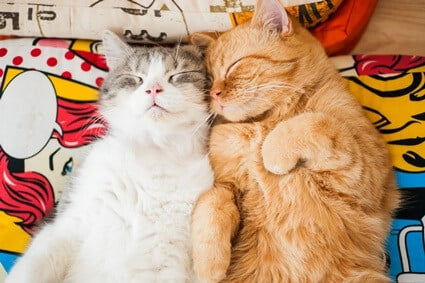
Age
Regardless of breed, many cats base their lifestyle around their age. Kittens are playful and attentive. Adult cats are inquisitive and natural hunters. Senior cats often want to sleep and be left alone. Pairings of inappropriate age brackets can cause frustration on both sides.
The most likely conflict will arise between kittens and senior cats. The kitten will want attention and to play whenever it is awake. The senior cat is unlikely to want to provide this stimulation. It’s not the kitten’s mother and thus feels no affection toward it.
Look to match cats that are not too far toward either extreme. Young adults can get along with older adults, or even a cat that just entered senior status. Don’t pair a kitten with a 14-year-old, though. That’s like asking an octogenarian to share their home with a toddler.
Temperament
Temperament is often an extension of age. Some cats have unique personality traits, regardless of their years. Some kittens are bossy and dominant. Some senior cats are bouncy and playful.
Ensure the two cats have a similar temperament as this suggests that they will seek to live similar lifestyles. This, in turn, minimizes the chances of conflict. Cats often co-exist best when they forge a mutual agreement to ignore each other.
Experience
Where possible, find out about the life experience of a second cat. If this varies wildly from your own cat, they may clash. Cats like to live according to an existing routine and abhor change.
For example, a cat that wandered outdoors will expect to do the same. If your current pet is an indoor cat, the new arrival likely will be too. This could leave the new cat unsettled and frustrated, possibly becoming belligerent.
Check if the new arrival has any fears and phobias based on past trauma. Your cat may inadvertently frighten the new arrival via its mannerisms. This is unfair to both cats if they cannot live their lives in a way they are accustomed to.
What Pets are Compatible with Cats?
If your cat is belligerent around other felines, you may wish to consider a different species. This can be more successful, but the same risks remain. Some cats are just incapable of sharing.
The main things to consider with a different animal are size and temperament. Larger animals easily spook cats. Sharing a home may leave the cat stressed and aggressive.
Do not assume that a cat will befriend a small animal. Cats have naturally high prey drives. When a cat sees a small, fast-moving animal, it feels compelled to hunt it.
You also need to weigh up the lifestyles and temperaments of different animals. Cats enjoy a quiet life. Another pet that is too active and boisterous will frustrate a cat. This, again, could lead to conflict.
Cats are capable of co-existing peacefully with other species. In some cases, the two animals may become friends.
Can You Get a Dog if You Have a Cat?
Pop culture has long depicted canines and felines as mortal enemies. The idiom fighting like cats and dogs is among the most popular in the English language. Cats and dogs can live together, though. If the relationship is managed well, they can even be the best of friends.
There are many reasons why cats and dogs frequently clash. Most of the time, it’s a matter of ballast and bluster from cats. Most cats are afraid of dogs. Dogs are usually physically bigger, louder, and stronger than cats.
A dog may approach a cat with the best of intentions. It just wants to say hello. It may even wish to instigate a playtime. Cats do not know this, though. A cat will assume that the dog wishes to do it harm. It will threaten or attack the dog as an act of self-preservation.
Over time, cats and dogs in the same home learn each other’s body language. Both species use their tails, ears, and scent to communicate. They do so in different ways. Like a Russian speaker cannot understand a Spanish speaker, a cat cannot understand a dog.
If you want a cat and dog to share a home, you’ll need to manage the relationship carefully. The first step to this is choosing an appropriate dog breed. The temperaments and personalities of different domesticated canines vary more than those of felines.
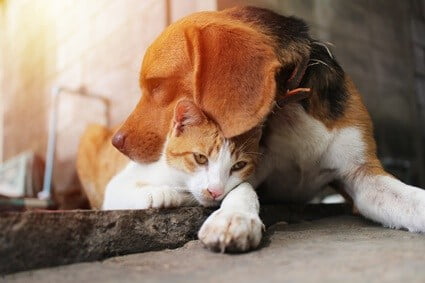
Dog Breeds That Get Along with Cats
If you’re looking to pair a dog and cat, pick a smaller, quiet, and calm dog. The larger a dog is in stature, the more likely it is to frighten the cat. The most gentle and loving Pitbull will intimidate a cat by its sheer presence.
Avoid small, yappy dogs with high prey drives. A Jack Russell, for example, will chase and terrorize a cat. This will lead to an antagonistic relationship that is unlikely ever to work out. The dog will be unable to control its instincts, and the cat will be perpetually stressed.
The following dogs are considered cat-friendly. Focus your search for canine companionship on these breeds.
- Beagle (the most popular dog breed in the USA for a reason)
- Shih Tzu
- Bichon Frise
- Pomeranian
- Dachshund
- Pug
- Poodle
- Golden retriever
Adopting one of these dogs is not a failsafe as all dogs have unique personalities. Some dogs are excitable or antagonistic by nature. Equally, some cats are naturally averse to all dogs. Attempt a trial run before forcing the two pets to live together.
Helping Dogs and Cats Co-Exist
Until a cat and dog learn more about each other, limit exposure. Wherever possible, keep the dog on a lead in the home. This will stifle the excitable temptation to lunge at a cat. Sharing space from afar helps the animals to grow confident and familiar with each other.
Feed the two pets independently, ideally in separate rooms. This prevents any conflict or jealousy between two food-focused animals. Cats can eat dog food in a pinch and vice versa. Each pet will gain more nutrition from meals designed for their species, though.
Once both animals have eaten, offer them an appropriate treat in a shared space. This reinforces the idea that time together is pleasurable. In addition, both cat and dog should be docile and calm after eating.
Ensure that both animals receive equal amounts of attention. Dogs are usually more overtly affectionate to owners than cats. If you spend all your time with a dog, your cat may become clingy.
Time apart is also key to maintaining a positive cross-species relationship. Eventually, these two animals may be able to spend plenty of time together. For a while, absence will make the heart grow fonder. This means taking your dog out.
Dogs have more energy than cats and require more exercise. A dog that has not been walked or exercised will be full of energy. This will leave the dog more likely to annoy the cat. If the dog is well exercised, it will be calm.
Can Cats and Rabbits Live Together?
In theory, cats and rabbits should never share a home. Cats are predators, and rabbits are born prey. In addition, both species are territorial. This suggests that the two animals will fight. The rabbit is likely to come off worse, even though rabbits can be effective pugilists.
In reality, rabbits can be quite bossy. As long as your cat is not too dominant or aggressive, it will accept this. The similarities between cats and rabbits can lead to a firm friendship. As is so often the case with cats, you need to create a good first impression.
If wild rabbits visit your backyard, let your cat watch them from afar. Do not let the cat approach as it may hunt or harm the rabbits. The idea is to remove the novelty of rabbits from a cat’s mind.
You must build your rabbit’s confidence. A rabbit may initially be frightened of a cat. Keep the rabbit in its hutch until it trusts the cat. If the rabbit turns tail and runs from a cat on sight, its hunting instincts will kick in.
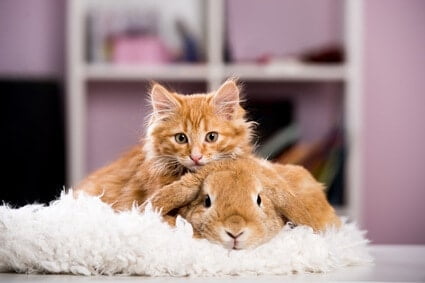
Once the cat and rabbit are familiar with each other, arrange a playtime. Place both pets in a communal space. Be ready to grab one or both if any conflict arises. Ideally, the two animals will ignore each other. Even better, they may play calmly or practice mutual grooming.
Even if a cat and rabbit seem to be getting along, supervise the interaction. The relationship can turn sour in an instant. Cats are still governed by instinct, and a rabbit may push its luck too far. An antagonistic rabbit may provoke a cat into attacking.
Although these two animals are predator and prey, they can co-exist. Ensure a rabbit has a hutch to retreat to. Make your cat’s territory inaccessible to a rabbit. This will ensure that the animals can get along in communal spaces.
Do Cats and Reptiles Get Along?
Cats and reptiles rarely make good housemates. The Open Conservation Biology Journal said that cats all but wiped out the wild lizard population of an Australian town. The fast, jerky movements of a lizard can be irresistible to a cat. That said, cats seem to get along well with bearded dragons.
Snakes are another pet that should be kept away from cats. While many people are afraid of snakes, these reptiles are shy and skittish. A snake that encounters a cat is likely to be afraid.
If the cat remains oblivious to the snake, the reptile will retreat and hide. If spotted, the cat may attack. It considers the snake a threat. Cats can kill snakes. If the snake decides to protect itself, it could cause harm to a cat.
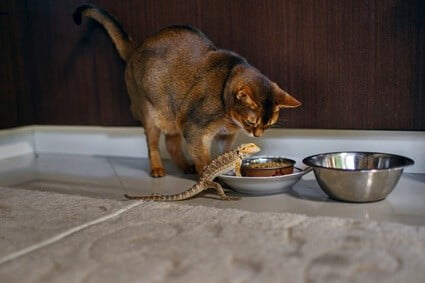
Venomous snakes are illegal as pets without an appropriate license. If you have such certification, you would hardly let a venomous snake roam free. Popular pet snakes, such as ball pythons and corn snakes, are constrictors.
Most reptiles will spend their entire days in a terrarium that replicates their natural habitat. This, in theory, keeps them safe from unwanted feline attention. Escape is possible, especially with snakes.
Can Cats Get Along with Birds?
As explained by Biological Conservation, wild birds are the preferred prey of most domesticated housecats. You will likely notice your own cat staring out of the window, chirping at birds outside. This is because the cat’s hunting instincts are entering overdrive.
Keeping small birds, such as finches, with cats is inadvisable. The two pets could form an unlikely friendship. Stranger things have happened, and enough exposure may temper a cat’s desire to hunt. This remains unlikely, though.
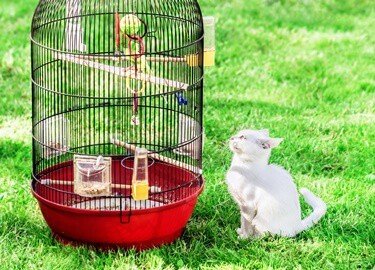
The cat will likely spend all day attempting to get to the bird within a cage. This will be no fun for your avian pet. It will spend its days in a constant state of stress. It may grow frustrated and aggressive when unable to do so.
You certainly cannot let the bird fly free if you have a cat. This will only end one way. Even the most docile and loving cat will find its hunting instincts triggered.
Exotic Birds
A larger bird, such as a parrot, may fare better living with a cat. The size of a Macaw or African Grey may intimidate a cat. In addition, the vocalizations of exotic birds are very loud and may frighten off a cat.
If the two animals interact, fighting becomes likely. A large bird could do just as much damage to a cat and vice versa. Parrots, to return to our previous example, have strong claws and potent bite force.
Chickens
If you keep chickens in your backyard for their eggs. Chickens can run free in a home populated by a cat. The usual caveat applies, though. You’ll need to take time to engage in training first.
Your cat is unlikely to have encountered wild chickens before, inspiring the cat to approach. Chickens, for their part, will start out oblivious. If startled, the chicken may become verbal or even aggressive.
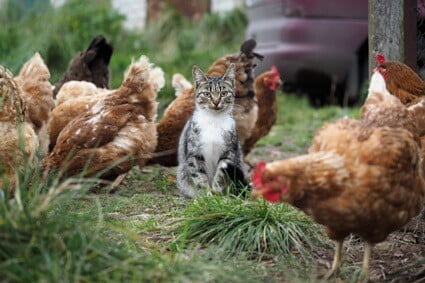
If a fight breaks out, a cat will likely make light work of a chicken. This means that you’ll need to help the animals grow used to each other. Initially, keep your chickens in a wire coop with an attached run. This provides enough space and protection for the birds.
Let your cat into the yard and distract it with play. You are trying to convince your cat that the presence of chickens is an irrelevance. If the cat is distracted, the sight, sound, and scent of chickens will hold less fascination.
Eventually, you can let the chickens run free for supervised play around a cat. You may need to remove the cat from the situation quickly. If enough time and training have passed, the two species will harmoniously co-exist.
Small Animals That are Good with Cats
As a rule of thumb, cats should never live with animals smaller than themselves. It is unfair to house a cat with an animal that would ordinarily be a source of food. For the most part, small furry animals are best kept away from cats.
Do Cats and Ferrets Get on?
Ferrets are small animals but playful and social. This means that a ferret could make a good companion for a young cat. You’ll need to set the relationship boundaries early.
Keep a dividing screen between the animals at first for the protection of both species. The cat may be instinctively tempted to chase a ferret. Alternatively, it may be afraid of the smaller animal and attack as it’s unlikely that a cat will have seen a ferret before.
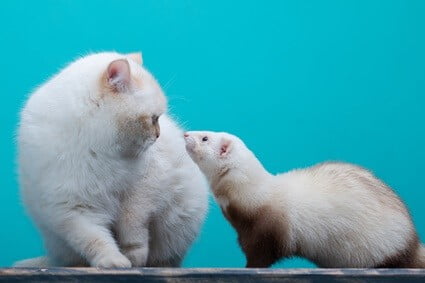
A ferret may provoke this aggression. Ferrets are small animals with brave hearts. A ferret may bite a cat’s tail. Ferrets also love climbing on the back of larger pets. Few cats will welcome this behavior from an unfamiliar animal.
Like cats, ferrets spend a lot of time sleeping. While playful when active, ferrets also doze away most of the day. This means that you can keep the smaller pet in a safe cage. Cats and ferrets need only interact during playtime.
If you manage the relationship, cats and ferrets can enjoy each other’s company. The cat will come to expect playtime with the ferret as part of its routine. Just separate them at the first hint of aggression.
Can Cats Live with Pet Rodents?
Hamsters, rats, gerbils, guinea pigs, and mice should all be avoided. You may fare slightly better with a chinchilla or a guinea pig, but it’s not a match made in heaven. All rodents risk falling foul of the predator vs. prey divide.
Many rodents, especially hamsters, are escape artists. Life in a cage can be dull for a small pet. This will inspire the rodent to seek freedom. Small animals explore the house, returning to the open when willing to re-enter their cage.
Cats like to explore. What’s more, cats will scent and hear these rodents from a distance. Cats are not interested in the etiquette of pets. They will not recognize the rodent as a beloved family member. They’ll see lunch.
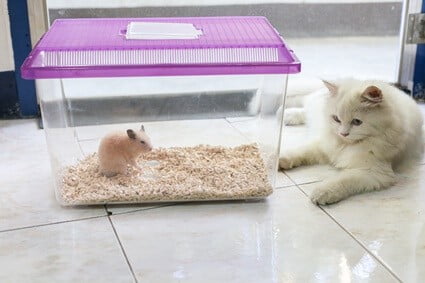
There is also the toll that this psychological stress will take on small animals. Rodents have weak hearts. The stress of being stalked by a cat can provoke cardiac arrest. Even staying in the cage may not protect a rodent from this fate.
If the cat picks up a small animal’s scent, it will hunt it down. The cat will then display patience, waiting for the rodent to leave its enclosure. It may also start to paw and scratch at the cage, which will terrify the smaller animal.
If you must have rodents and cats in the same house, keep them separated. Keep the rodent in a cage. When exercise time arrives, keep the rodent in a ball and lock the cat in a separate room.
Can I Keep Fish if I Have a Cat?
Fish are another popular pet that cats consider a food source. Aquatic pets will never fail to capture a cat’s imagination. The cat may attempt to capture and devour live fish.
A goldfish is an inadvisable pet if you have a cat. A small, solitary fish will live in a smaller bowl. This makes it easier for the cat to gain access. The cat may knock a bowl to the ground to gain access to the fish.

This makes it easy for the cat to eat the fish. The cat may cut its paws on a broken bowl. Equally, eating live fish can make cats unwell. Keeping fish in a tank is usually far safer.
A tank filled with exotic fish provides a cat with entertainment. Cats find watching fish relaxing but ensure your cat cannot gain access to the tank. Cover the top to ensure your cat doesn’t fall in.
If you keep fish in a garden pond, protect them from your cat’s attention. Most cats dislike getting wet. This means they may give the pond a wide berth. All the same, cover the pond with wire.
If your cat is lonely, consider getting a second pet. Just remember, all felines have different temperaments. Assess what species you feel your cat will get along with best. Bringing a second animal into a cat’s home is not a decision to rush.

